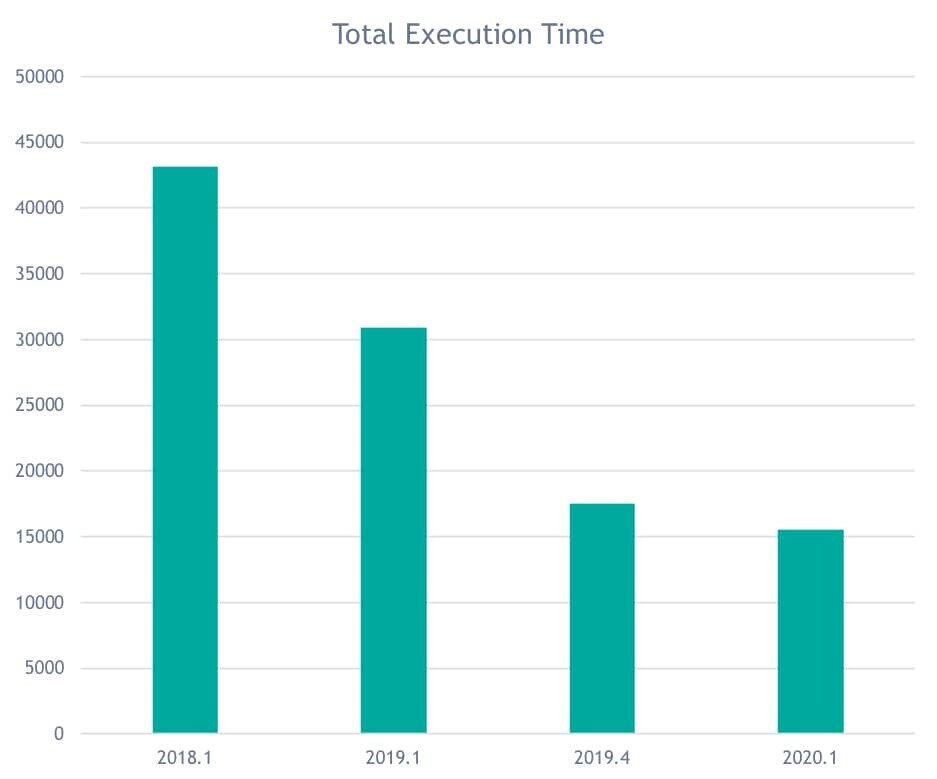I often find myself having conversations with customers and prospects about their frustrations when it comes to accessing data. The most common request they have is around the ‘ need for speed’ – and understandably, this is quite right.
As data continues to grow at exponential rates, businesses — whether they’re focused on financial services, retail, IoT, manufacturing or healthcare — need not only to receive data quickly, but also analyze it in that same instance to be able to execute programmatic actions and make critical business decisions.
The good news? Having almost instantaneous performance times for concurrent data ingestion and queries is a reality. It’s what we have been offering and refining here at InterSystems for years. Gartner calls this capability Augmented Transactions [i] [1]; others such as Forrester call it Translytics. Whatever it’s called, we know that the proof is always in the pudding, so we have been continually measuring and working hard to improve the performance of our software with each release for many years now. In fact, in our latest version of InterSystems IRIS, the performance for some of our most challenging customer applications has improved in some cases by a factor of 3X (and more) over the past two years. InterSystems IRIS is now benchmarked to ingest a record, create the record in memory, and index it to be available for queries on commercially available hardware, all in tens of nanoseconds. To put that in perspective, that’s less than the amount of time it takes your voice to travel about one inch from your mouth when you speak.

Continual Performance Improvements of InterSystems IRIS Data Platform for a Large Customer Application
But many of our customers and partners often ask us how the performance of InterSystems IRIS compares with other products they’re using or considering. So we designed a performance test that we tried to make as fair as possible to measure exactly that.
For those of you who regularly visit our GitHub or Open Exchange pages, you may have already seen it. The Speed Test compares InterSystems IRIS alongside popular databases from a number of different cloud and data management vendors. It consists of processing both ingestion and query workloads simultaneously in the same database instance to simulate a multi-workload use case that a.) doesn’t favor any product and b.) you can easily run for yourself on the cloud or on your laptop and c.) can be extended to your own data and queries, since we’ve released the test as customizable open source code.
It’s important to note that the Speed Test is designed to test a specific element of databases – how much data they can ingest and query at the same time, and how this impacts performance.
To give an example, think of a financial services firm. It needs high rates of data ingestion with concurrent analytics to be able to execute trades at high transaction rates, and at the same time support thousands of users simultaneously querying the real time data for order status, risk, asset allocation, etc. In such use cases, it is critical the database being used is scalable, reliable, and provides high performance for both transactions and analytic queries simultaneously, so it can withstand the pressure being applied to it.
We designed the Speed Test to simulate this pressure and record how the database responds.
How did we use the Speed Test?
In this testing, we compared InterSystems IRIS with the other data platforms, all running in the AWS Cloud, and all running for 1,200 seconds (20 minutes). The AWS infrastructure configurations were selected to ensure an “apples to apples” comparison. Based on requests from our customers, we’re currently comparing InterSystems IRIS with four other popular databases: SAP HANA Express 2.0, AWS Aurora (MySQL) 5.6.10a, AWS RDS SQL Server 2017, and Sybase ASE 16.0 SP03 PL08, public cloud edition, premium version.
In every case, InterSystems IRIS outperforms the other products for both ingestion and concurrent querying, ranging from 59.9% faster to 67 times faster.
To be completely transparent once we’d run the test ourselves, we published the open source Speed Test benchmark kit on GitHub and contracted with the Validation Services division of Enterprise Strategy Group (ESG), an IT analyst, research, validation, and strategy firm that provides market intelligence and actionable insight to the global IT community to review and validate the test and the results.
What did the Speed Test find?
ESG validated that the test provided a fair comparison of the various products, and that InterSystems IRIS significantly outperformed the other leading traditional and in-memory data platforms, ingesting more data (about 100 million records), faster, while simultaneously querying more data with faster query rates (more than 20,000 records / sec), delivering microsecond query response times. You can learn about the results in detail and the exact workings of the Speed Test during the webinar we’re holding with ESG. After the webinar, you’ll even receive the full ESG report write up.
It’s vital to stress that this is just one type of test, using criteria that creates as fair a test as possible for all of the products. However, we know that every situation is different, so we encourage you head to our GitHub page and test out the kit for yourself in AWS or using Docker on a local machine, and to make changes to the test or the configurations to more closely match your specific requirements.
Read the latest blog posts on Data Excellence.
Register for the upcoming webinar with ESG on August 5 here.
[1] Hype Cycle for Data Management, 2019. 31 July 2019 G00369950 Analyst(s): Donald Feinberg, Adam Ronthal




































